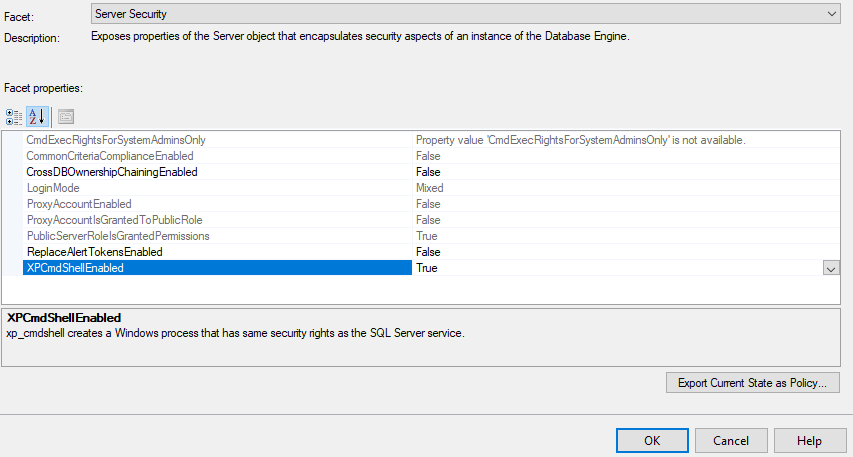If you have sysadmin privileges and don't enable xp_cmdshell and you issue a command such as the following to get a directory listing of the C: drive:
xp_cmdshell 'dir c:\'
Msg 15281, Level 16, State 1, Procedure xp_cmdshell, Line 1 [Batch Start Line 0]
SQL Server blocked access to procedure 'sys.xp_cmdshell' of component 'xp_cmdshell' because this component is turned off as part of the security configuration for this server. A system administrator can enable the use of 'xp_cmdshell' by using sp_configure. For more information about enabling 'xp_cmdshell', search for 'xp_cmdshell' in SQL Server Books Online.
If you don't have sysadmin privileges and try to run xp_cmdshell whether it
is enable or not you get this error message:SQL Server blocked access to procedure 'sys.xp_cmdshell' of component 'xp_cmdshell' because this component is turned off as part of the security configuration for this server. A system administrator can enable the use of 'xp_cmdshell' by using sp_configure. For more information about enabling 'xp_cmdshell', search for 'xp_cmdshell' in SQL Server Books Online.
Msg 229, Level 14, State 5, Procedure xp_cmdshell, Line 1 [Batch Start Line 0]
The EXECUTE permission was denied on the object 'xp_cmdshell', database 'mssqlsystemresource', schema 'sys'.
Another error you may get if you try to enable xp_cmdshell using sp_configure when advanced
options is not set is the following error:The EXECUTE permission was denied on the object 'xp_cmdshell', database 'mssqlsystemresource', schema 'sys'.
Msg 15123, Level 16, State 1, Procedure sp_configure, Line 62 [Batch Start Line 2]
The configuration option 'xp_cmdshell' does not exist, or it may be an advanced option.
So in order to use xp_cmdshell whether you are a sysadmin or a regular user
you need to first enable the use of xp_cmdshell.The configuration option 'xp_cmdshell' does not exist, or it may be an advanced option.
Enable xp_cmdshell with sp_configure
The following code with enable xp_cmdshell using sp_configure. You need to issue the RECONFIGURE command after each of these settings for it to take effect.-- this turns on advanced options and is needed to configure xp_cmdshell sp_configure 'show advanced options', '1' RECONFIGURE -- this enables xp_cmdshell sp_configure 'xp_cmdshell', '1' RECONFIGURE
Disable xp_cmdshell with sp_configure
The following code with disable xp_cmdshell using sp_configure:-- this turns on advanced options and is needed to configure xp_cmdshell sp_configure 'show advanced options', '1' RECONFIGURE -- this disables xp_cmdshell sp_configure 'xp_cmdshell', '0' RECONFIGURE
Enable or Disable xp_cmdshell with SSMS Facets
From within SSMS, right click on the instance name and select Facets.The in the Facet drowdown, change to Server Security as shown below.
You can then change the setting for XpCmdShellEnabled as needed to either True or False. After changing the value, click OK to save the setting and the change will take effect immediately. There is not a need to enable show advanced options or use reconfigure, the GUI takes care of this automatically.

Granting Access to xp_cmdshell
Let's say we have a user that is not a sysadmin, but is a user of the master database and we want to grant access to run xp_cmdshell.-- add user test to the master database USE [master] GO CREATE USER [test] FOR LOGIN [test] GO -- grant execute access to xp_cmdshell GRANT EXEC ON xp_cmdshell TO [test]
Msg 15153, Level 16, State 1, Procedure xp_cmdshell, Line 1 [Batch Start Line 0]
The xp_cmdshell proxy account information cannot be retrieved or is invalid. Verify that the '##xp_cmdshell_proxy_account##' credential exists and contains valid information.
There is not a need to give a user sysadmin permissions or elevated
permissions to run xp_cmdshell. To do so you can create a proxy account as
shown in this tip
Creating a SQL Server proxy account to run xp_cmdshell.
The xp_cmdshell proxy account information cannot be retrieved or is invalid. Verify that the '##xp_cmdshell_proxy_account##' credential exists and contains valid information.
No comments:
Post a Comment
Note: only a member of this blog may post a comment.